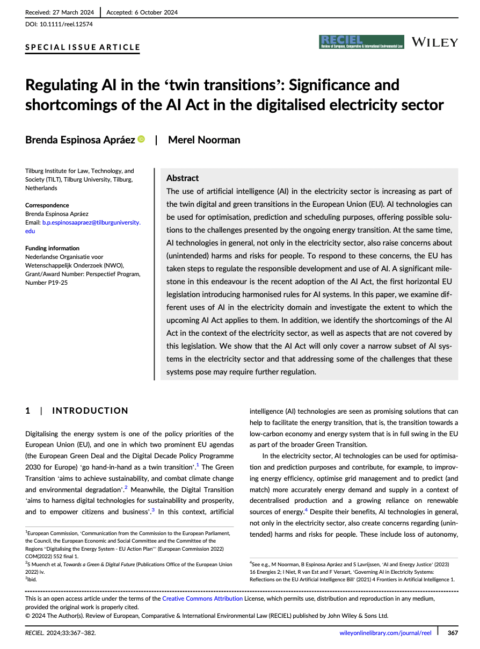- New Article
- New Article
- New Article
- New Article
- New Article
- New Article
- New Article
Unveiling the Gaps: Why the EU AI Act Isn't Enough for the Electricity Sector
The European Union is at the crossroads of two monumental transitions: the digital revolution and the shift towards green energy. As part of this transformation, artificial intelligence (AI) is increasingly being integrated into the electricity sector. From optimizing energy consumption and predicting usage patterns to efficiently scheduling resources, AI technologies hold the promise of revolutionizing how we produce, distribute, and consume electricity. These advancements aim to tackle pressing challenges such as integrating renewable energy sources and enhancing grid stability. However, the rapid adoption of AI in this critical sector brings forth a host of concerns. Unintended harms, ethical dilemmas, and risks to individuals and communities have become pressing issues that demand attention. Recognizing these challenges, the European Union has introduced the AI Act—the first horizontal legislation aimed at harmonizing rules for AI systems across member states. But does this Act sufficiently address the unique complexities of the electricity sector?
Merel Noorman, Assistant Professor in AI, Robotics, and Science & Technology Studies at Tilburg University, and coordinator of the AI & Robotics group at the Tilburg Institute for Law, Technology, and Society (TILT). Alongside co-author Brenda Espinosa Apráez, Noorman contributes an incisive analysis in a special issue of the Review of European Community & International Environmental Law (RECIEL), edited by Sascha van Schendel and Leonie Reins. Their article, titled “The EU AI Act and the Electricity Sector: A Call for Broader Regulation,” critically examines the applicability of the EU AI Act to the electricity sector.
The article reveals that the EU AI Act, while groundbreaking, covers only a narrow slice of AI systems used in the electricity sector. This oversight leaves a vast array of applications unregulated—a worrisome gap given the interconnectedness of modern electricity grids. In such complex networks, the failure of a single AI system can cascade, leading to widespread disruptions.
It highlights that the Act doesn’t adequately address systemic risks unique to the electricity grid. AI systems in this sector aren’t standalone; they interact in multifaceted ways that can amplify errors and vulnerabilities. Moreover, the Act falls short in tackling ethical concerns like fairness in energy distribution and algorithmic discrimination. Without proper oversight, AI could inadvertently favor certain communities over others, exacerbating inequalities. The insights from the article serve as a critical wake-up call. As AI continues to permeate the electricity sector, the potential benefits are immense—but so are the risks if left unchecked. The authors underscore the necessity for a more comprehensive regulatory framework that not only fosters innovation but also safeguards society against unintended consequences.
Curious about the intricate challenges and proposed solutions? Read the full article here.
